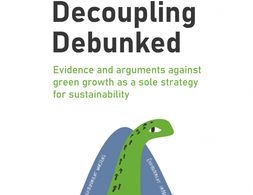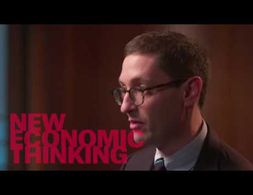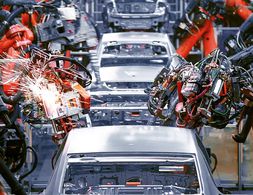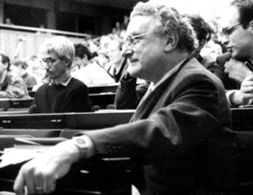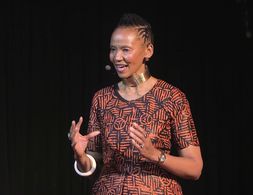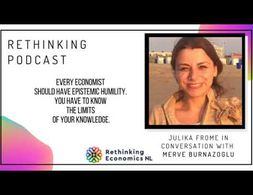✕
938 results
Understanding international trade is central to economics and is currently a hot political issue. It’s an area where popular perceptions of mainstream economics are low, since they have historically missed some important downsides of trade agreements, especially the hollowing out of former manufacturing hubs in the Western world. et economists have for long time had a theory of trade with an impressive amount of scientific clout behind it: the gravity trade model.
This study aims to provide insights on how the Social and Solidarity Economy (SSE) is contributing to the future of work.
The workshop introduces into the field of critical political economy and tries to identify the role of finacial markets in capitalism, the reason for financial crises and the relevance of Marx in regard to these topics.
How exactly are persisting social inequalities and the operations of modern finance connected? Adam Tooze provides a detailed answer to a still relevant problem by focusing on the Great Financial Crisis and the role of the finance industry in the USA.
From the theoretical literature, the authors provide seven reasons to be sceptical about the occurrence of sufficient decoupling in the future. In addition to the extensive summary of the recent literature, 'decoupling debunked' provides a great introduction into the decoupling hypothesis.
The goal of the class is to acquire familiarity with recently-published research in alternative macroeconomics with a focus on the distribution of income and wealth, cyclical growth models, and technical change.
In a capitalist system, consumers, investors, and corporations orient their activities toward a future that contains opportunities and risks. How actors assess uncertainty is a problem that economists have tried to solve through general equilibrium and rational expectations theory. Powerful as these analytical tools are, they underestimate the future's unknowability by assuming that markets, in the aggregate, correctly forecast what is to come.
This is a great book Against the background of the dogmatism of much of modern economics Fullbrook has produced an innovative wide ranging argument for narrative pluralism The timely book is beautifully written accessible to all provocative extraordinarily insightful and extremely compelling Tony Lawson Cambridge University UK This fascinating and …
The Elgar Companion to Neo-Schumpeterian Economics surveys the achievements of the most visible scholars in this area. The contributions to the Companion give both a brief survey on the various fields of neo-Schumpeterian economics as well as insights into recent research at the scientific frontiers.
Homo sapiens is now evolving into post economy The New Economy must manage scarcity and affluence a dual problem that is not integrated into the main classical economic theories There will be an important shock between opulence described by the economist John Kenneth Galbraith in The Affluent Society and scarcity …
Mr Minsky long argued markets were crisis prone His moment has arrived The Wall Street Journal In his seminal work Minsky presents his groundbreaking financial theory of investment one that is startlingly relevant today He explains why the American economy has experienced periods of debilitating inflation rising unemployment and marked …
Human Rights Economics strives for an economic system that is just for people and respectful of the planet that promotes social and economic justice that integrates a plurality of views and traditions and that is human rights consistent in both its processes and outcomes It posits that economics is blind …
Surviving the Future is a story drawn from the fertile ground of the late David Fleming's extraordinary 'Lean Logic: A Dictionary for the Future and How to Survive It'. That hardback consists of four hundred and four interlinked dictionary entries, inviting readers to choose their own path through its radical vision. Recognizing that Lean Logic's sheer size and unusual structure can be daunting, Fleming's long-time collaborator Shaun Chamberlin has selected and edited one of these potential narratives to create Surviving the Future. The content, rare insights, and uniquely enjoyable writing style remain Fleming's, but are presented here at a more accessible paperback-length and in conventional read-it-front-to-back format
This book provides a comprehensive description of this intriguing new area of feminist economics. It includes discussion of what constitutes feminist economics and how feminist economics is different from other approaches
This course offered by the International Monetary Fund (IMF) on edX provides an introduction in the major econometric tools used in standard Macroeconomics.
Imperialism is not only about military force and political pressure applied by developed capitalist countries on less developed ones for economic gain It also has an everyday dimension Countless acts of production and consumption the current SUV boom being a prominent example draw on exploitation of resources and labour from …
The productive work of widely distributed academic research has contributed substantially, over the postwar period, to important advances in our understanding. It has also offered a clearer recognition of many unresolved problems. Never theless, the progress achieved over the last decades, ex hibited by the systematic application of "theory" to actual issues and observable problems, could not overcome a per vasive sense of dissatisfaction.
How can we establish new institutions and practices in order to use fare-free public transport as a beacon for sustainable mobility and a low-carbon lifestyle? The author of this essay elaborates on how practice theory and institutional economics can help to answer this question.
How do people make decisions? There is a class of models in psychology which seek to answer this question but have received scant attention in economics despite some clear empirical successes. In a previous post I discussed one of these, Decision by Sampling, and this post will look at another: the so-called Fast and Frugal heuristics pioneered by the German psychologist Gerd Gigerenzer. Here the individual seeks out sufficient information to make a reasonable decision. They are ‘fast’ because they do not require massive computational effort to make a decision so can be done in seconds, and they are ‘frugal’ because they use as little information as possible to make the decision effectively.
The core of Georgism is a policy known as the Land Value Tax (LVT), a policy which Georgists claim will solve many of society and the economy’s ills. Georgism is an interesting school of thought because it has the twin properties that (1) despite a cult following, few people in either mainstream or (non-Georgist) heterodox economics pay it much heed; (2) despite not paying it much heed, both mainstream and heterodox economists largely tend to agree with Georgists. I will focus on the potential benefits Georgists argue an LVT will bring and see if they are borne out empirically. But I will begin by giving a nod to the compelling theoretical and ethical dimensions of George’s analysis, which are impossible to ignore.
In this video University of Warwick Economist Robert Akerlof provides an introduction to a new type of behavioral economics He explains how this type is being driven by a desire to understand how people are shaped by social interactions and what the economic consequences of this are He begins the …
The concept of financialisation has undergone a similar career as ‘globalisation’, ‘neoliberalism’ or even ‘capitalism’, in the course of which it changed from the explanandum to the explanans; the process of financialisation is taken for granted, while the concrete historical and empirical causal conditions of its realisation and perpetuation are being moved into the background.
This lecture is all about the challenge to include heterodox approaches into macroeconomics. After giving an overview of recent approaches to that problem Professor Michael Roos presents the theoretical framework of Complexity Economics as a means to combine behavioral aspects with macroeconomics.
UBC's Henry Siu, a professor at the Vancouver School of Economics, speaks about innovation in economics, technological progress and what it means for the fut...
Ernest Mandel, a heterodox Marxist economist, shows here how a political economist can analyse systems such as the Soviet Union.
A rethinking of the way to fight global poverty and winners of the Swedish Bank Prize for Economics.
This talk is an exploration of a feminist centred world, where women's labour, women's energy, women's contributions to the economy are not a side event but the main event.
This Perspective argues that ergodicity — a foundational concept in equilibrium statistical physics — is wrongly assumed in much of the quantitative economics literature. By evaluating the extent to which dynamical problems can be replaced by probabilistic ones, many economics puzzles become resolvable in a natural and empirically testable fashion.
Rethinking Economics NL explores every month together with a new host the field of economics from a different perspective.
This essay analyses how the role of central banks changed since the global financial crisis, and how this directional change was accelerated by the outbreak of Covid-19.
The usual background and distinctions between complexity and neoclassical economics are presented Neoclassical economics deals with perfectly rational representative agents this creates states of equilibrium On the other hand complexity economics relaxes these assumptions to deal with responsive agents in an uncertain dynamic environment this creates states of disequilibrium More …
Mainstream economic narratives notably the concept of comparative advantage trade theory which assumes the equal balance of power between parties are deployed to support the merits of Global Value Chains that the global integration via trade creates mutual gains for both developed and developing countries This narrative is advanced in …
We use cookies on our website. Click on Accept to help us to make Exploring Economics constantly better!





